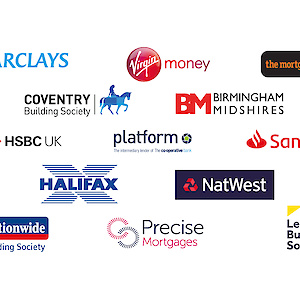


Head of Content

Mortgage Advisor & Director

If you have late or missed payments on your credit record, it can be harder to convince finance providers to let you borrow money in the future, so this can create a conundrum if you need to apply for a mortgage.
If you need a mortgage or remortgage but are worried late/missed payments might make approval tricky, you’re in the right place. Here, you’ll learn how missed payments might affect your application, what you can do to minimise their impact, and how we can help you get approved with the best rate.
What is classed as a late payment?
If you made a payment on a credit agreement at least 30 days after its due date, it can be recorded as officially ‘late’. This 30-day window is a grace period where you will usually have the opportunity to settle the debt before it is reported to the credit reference agencies.
Some lenders and creditors won’t report a late payment until 60 days have passed, but if it does end up being reported, it can remain on the borrower’s credit reports for up to seven years, and will be a red flag to future finance providers, including mortgage lenders.
Late payments are similar to arrears, but the key difference is that the debt is recorded as having been paid, albeit not on time. Arrears are missed payments that have gone on to become outstanding debt and are a more severe form of bad credit.
How do they affect mortgage applications?
Mortgage lenders don’t treat late payments as one of the more severe forms of adverse credit, but having them in your credit history can be problematic all the same. Some mortgage providers might view your application with caution if you’ve missed payments in the past, potentially raising the interest rate they are willing to offer or asking for a larger deposit.
If you have missed a lot of payments in a relatively short space of time, some lenders might even decline you for a mortgage altogether.
How far back do lenders look for missed payments?
Although missed payments remain on your credit files for seven years, mortgage lenders will only look at the last six years when carrying out their credit checks.
You can check whether you have any late payments that will show up by accessing a free trial with our affiliate partners through this link and downloading your credit reports.
Can you get a mortgage with late payments?
Yes. It is possible to get approved for a mortgage with late payments on your credit reports. Most mortgage providers don’t treat them as a severe form of bad credit, but getting a favourable deal can prove difficult since adverse of any kind can be a red flag to lenders.
Only a small minority of mortgage lenders will decline a borrower outright because they have late payments against their name, but many of them will ask for a larger deposit or increase the interest rate to help offset the risk, in some circumstances.
Since it can be tricky to get the best mortgage deal with a history of late payments, borrowers in this situation are advised to apply through a specialist bad credit mortgage broker.
Is it more difficult to get to get approved with missed payments?
Yes, but it is still doable. How concerned a lender will be about a missed payment will depend on whether the debt was secured or unsecured, how long ago it happened, the amount and time taken to rectify.
Secured loan payment issues such as a mortgage are seen as more severe than unsecured credit such as a phone bill. If you have the odd blip in your credit history, this is unlikely to make a significant difference, but if you have a repeated history of missing or being late with payments, this is more troubling to lenders.
For first-time buyers who are typically applying with a smaller deposit, their credit history is more likely to sway a lender than a remortgage or someone applying with a lower loan to value ratio. A high loan to value ratio means that the buyer is more susceptible to downward movements in house prices, potentially leaving them in negative equity and creating more risk for the lender as they may not be able to recoup the loan value if the buyer defaults on payments.
Check whether you are eligible
Mortgage lenders will assess what kind of deal you qualify for by taking a look at the circumstances surrounding your missed/late payments. They will review the following:
- Whether the payments were secured: Missing payments on a secured credit agreement, such as a mortgage or secured loan, is considered more serious than a missed payment on an unsecured debt, such as a mobile phone contract.
- The number of missed payments: One missed payment in the last six years is unlikely to have a major impact on a mortgage application, but some lenders place a cap on the number you can have in a certain time period. No more than two within 12-36 months is a common requirement, although there are providers with no set rule for this.
- How long ago they were: Late payments remain on your credit reports for seven years, but the good news is that they have less of an impact with each year that passes. Late payments that are over two years old generally aren’t an issue for most mortgage lenders, but some might penalise you if you missed a payment in the last six months.
- Why they occurred: A late payment could potentially be overlooked by a mortgage lender if you had a good reason for it occurring, such as illness or redundancy.
How much deposit you will need
It is possible to get a mortgage with late payments even if you have the minimum deposit amount of 5-10% of the property’s value, but this might mean paying a higher interest rate. Putting down anywhere between 15-20% should see the rate you are offered normalise.
Better deals will kick in if you can stretch to more than this, but some lenders might insist on more than the minimum if your late payments were recent and there was more than one.
Other factors
To determine whether you qualify for a mortgage, the lender will also assess you against their general eligibility criteria, which will include a look at the following factors:
- Age: It can be harder to get approved for a mortgage if you have missed payments and will be aged between 75 and 85 during the mortgage term. Some lenders have maximum age caps in place, but there are specialist lenders who could help.
- Property type: Buying a non-standard construction home - i.e. one that isn’t made from bricks and mortar - could also be an added complication that requires a specialist lender.
- Other credit issues: You will find your choice of available lenders and deals will be fewer if you have other credit problems as well as missed payments. Having multiple types of bad credit against your name is classed as severe adverse credit.
The criteria above was sourced from Criteria Brain and Knowledge Bank.
How to get a mortgage with missed or late payments

We recommend beginning the application process by speaking to a mortgage broker, since applying with a history of late payments could mean paying a higher interest rate if you were to approach a mortgage lender at random or choose one through a quick Google search.
The expert brokers at Teito have access to the entire market and maintain deep working relationships with mortgage providers who specialise in bad credit, which often means they can access exclusive interest rates and deals for customers just like you.
Your broker will quickly assess your needs, circumstances and credit situation to match you with the lender who is ideally placed to offer you the best available deal. This means that you could potentially save time, money and avoid disappointment in the long run.
Ready to get started with a mortgage broker and find out how much you could save? Make an enquiry below to begin with a free, no-obligation chat today.

Secure your ideal mortgage today
Remortgaging with missed or late payments
You will face the same challenges if you are remortgaging with late payments compared to someone taking out a mortgage. If the late payments were on the mortgage itself, your lender might have reservations about offering you a low-rate deal, depending on how recently you missed a mortgage payment and whether you had a good reason for it.
If you hold substantial equity in your home, say 25% or more, your chances of securing a favourable rate should be strong, despite your history of late payments.
It’s worth consulting with a broker to explore what kind of deals are available across the whole of the market. A specialist bad credit lender might be better placed to offer a lower interest rate if your current mortgage provider is reluctant because you missed a payment.
You can read more about remortgaging with bad credit in our standalone guide.
Will your maximum borrowing be impacted?
It is unlikely that missed payments in your credit history will limit the maximum amount you can borrow. Most lenders will still be prepared to offer you 4.5 times your annual income, as is standard. Others might stretch to 5 times income or higher, under the right circumstances.
You can get an idea of what your maximum borrowing will be by using our calculator below:
Which mortgage lenders will consider your application?
The good news is that there are a variety of lenders available if you need to get a mortgage or remortgage with late payments against your name.
Below you will find examples of these lenders and their criteria:
- Aldermore: Will consider lending provided the missed payments were not in the last three months and the borrower has no more than than two months’ arrears in the last 24 months.
- Darlington Building Society: Will allow one missed payment on consumer credit agreements in the last 12 months. For missed loan payments, customers are expected to have none in the last three years.
- Halifax: Can consider mortgage applicants with late payments but will use internal credit scoring when making their final lending decision.
- Nationwide: Will use internal credit scoring to shape their lending decision and will expect the borrower to have a reasonable explanation for their missed payments.
The above information is intended to provide a snapshot of the market for example purposes. Speaking to a mortgage broker is recommended over approaching a lending directly as this will open up a much wider range of lenders, rates and deals to you
Compare the latest mortgage rates
Interest rates can be slightly higher for mortgage applicants with a history of late payments, but just how much higher will depend on how long ago they occurred, how much they were for and the overall strength of your application. You can compare the latest rates from lenders across the market using our free mortgage sourcing tool below:
Compare Rates
Showing Top Result Results
No results matching your criteria
Lender Details
Product Details
Why choose Teito for your mortgage needs?
If you have a history of late payments, it’s a good idea to apply for your mortgage or remortgage through a specialist broker as this will boost your chances of securing a favourable deal.
Our whole-of-market mortgage brokers specialise in bad credit and have a strong track record helping people with late payments get the best rate available. But that’s not the only reason to choose Teito to help with your mortgage needs - here are some of the other benefits:
- We are five-star rated on leading review websites
- You can get a rates comparison of the whole market
- We could secure an agreement in principle for you in minutes
- Our brokers can offer bespoke advice for people with bad credit
Ready to get started? Make an enquiry to kick things off with a free, no-obligation chat that won’t leave any marks on your credit report
FAQs
There are several scenarios that mortgage lenders will consider mitigating circumstances for late payments, whether you’re applying for a new mortgage or have missed a payment on an existing one and are hoping to avoid being penalised.
Your lender is likely to be lenient if any of the following applies:
- A redundancy
- Serious accident or illness
- Bereavement
- An unexpected bill for a substantial amount
- A payment you are legally owed failing to materialise
The above is merely a handful of examples. There are other unexpected life events that lenders might accept as a reasonable explanation for a missed payment - but the most important thing is to tell the lender if you have missed a payment or are going to miss one.
Choosing an Adviser
Selecting a qualified and experienced mortgage adviser is of great importance. To choose a suitable adviser, evaluate their qualifications, experience, and reputation, and ensure they are regulated by the Financial Conduct Authority (FCA).
Read reviews from previous clients and make sure they provide a clear explanation of the products and services they offer, as well as the fees and charges associated with them.





















































































































































